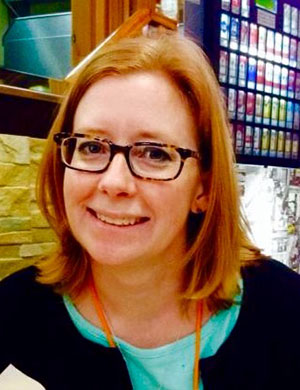
Kristen Link
The students in Kristen Link’s high school German classes in Illinois learn a lot more than a new language. With the help of Echoes and Reflections, they also learn about one of the darkest chapters in German history.
Link has taught the Holocaust as part of her German classes for over 15 years, but said she has felt for a while that something was missing from her teaching. She thought that there had to be a way to make her teaching on the subject more effective.
After getting on a mailing list for Echoes and Reflections, Link found out about the monthly three-part online professional development course that introduces educators to the resources of Echoes and Reflections and decided to participate in the course held this past April.
Echoes and Reflections is a partnership between USC Shoah Foundation, Yad Vashem and Anti-Defamation League. It includes 10 lessons that include everything educators need to teach the Holocaust, including survivor testimony clips, primary source documents and discussion questions.
Link said the course gave her access to new approaches and lesson ideas. She even wrote her own lesson incorporating survivor testimonies about Jewish resistance, which she said “changed the way my students and I thought about the idea of what it means to resist, especially in those times of ‘choiceless choices.’”
In fact, Link’s students reported that they wanted to hear even more from the survivors and witnesses in the testimony clips.
“This is a great way to use [the survivors’] own words to bring historical events to life,” Link said. “Because when it comes down to it, it's about people.”
Link feels a special responsibility as a German teacher to expose her students to the Holocaust, and tell the truth about the country and its history. Glossing over the “ugly parts” of Germany’s history would do her students a disservice, she said, and they need to understand that this history is never truly in the past.
“In terms of human history, these terrible things happened yesterday. We can't shove them in a chest in the dusty attic of ancient history and pretend that things have changed drastically, that we as humans have somehow grown out of suspicion, hatred, and fear,” she said. “The victims were our fellow human beings, but so were the perpetrators. That should be terrifying.”
Link always seeks a balance between facts and personal stories in her teaching, so her students understand what happened but also why it happened, and to whom.
The most important reason to teach the Holocaust is to evoke empathy, Link said –to get her students to make connections to real people and encourage critical thinking. Echoes and Reflections, and the survivor testimonies included in it, can help both new and experienced teachers do just that.
“All the thinking and feeling is worthless unless they really make connections,” she said. “As we get further away from the stories, they fade into abstraction. By telling their stories and hearing their own words, we honor the memory and memories of those who suffered.”